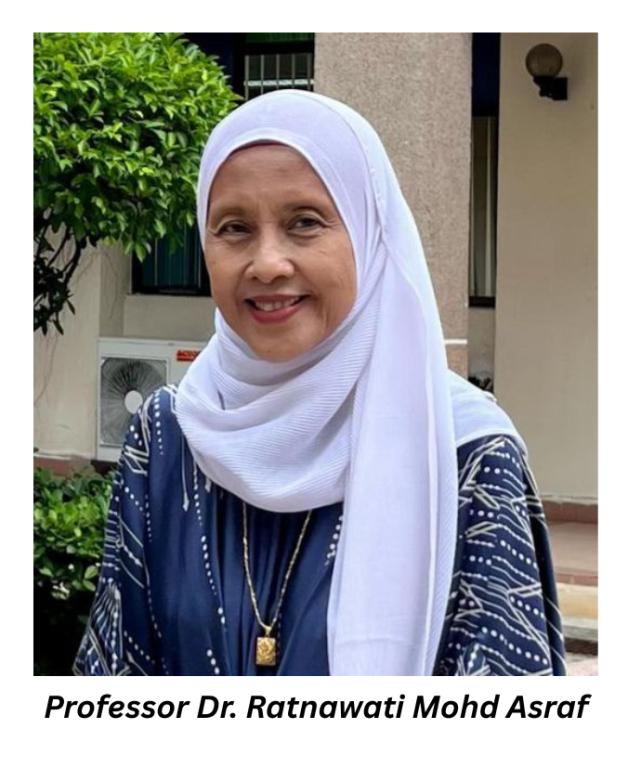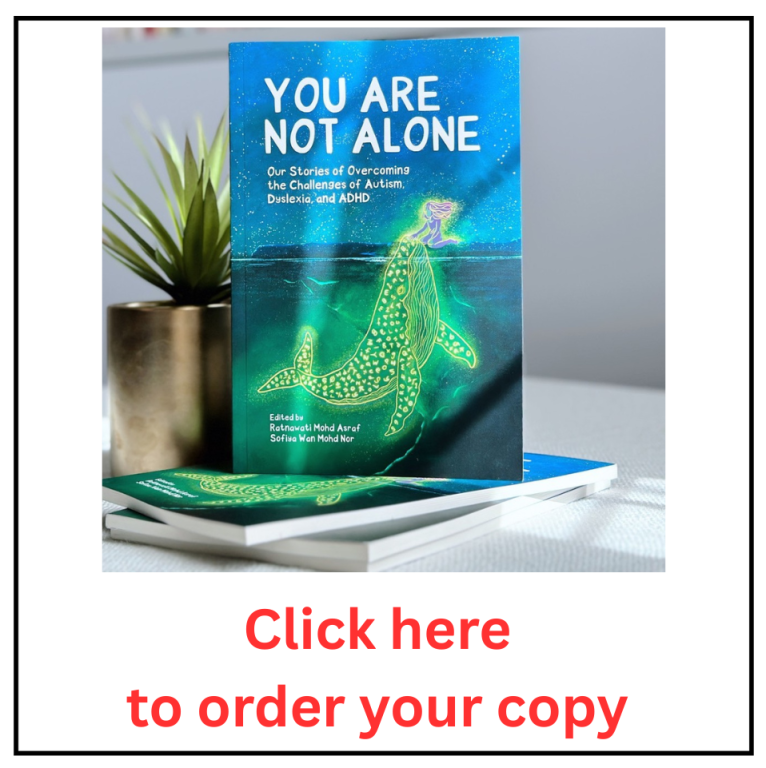SKIP
SKIP
[Baca versi Bahasa Melayu]
Professor Dr. Ratnawati Mohd Asraf’s journey into the world of neurodiversity began with a deeply personal experience—witnessing her own grandchildren struggle with learning difficulties. What started as a personal concern soon grew into a passionate commitment to advocate for neurodiverse learners. In this heartfelt interview, she shares the inspiration behind her book, You Are Not Alone, a powerful collection of real-life stories of neurodivergent individuals and families.

JS: Tell us about yourself.
RA: I’m a mother of four wonderful daughters and a grandmother to nine beautiful grandchildren. I also serve as a professor of education at the Kulliyyah of Education, International Islamic University Malaysia (IIUM), where I’ve been actively involved in teaching, research, and publication since 1990. For the past decade, my research has focused on special education and neurodiversity—an area that’s become close to my heart.
JS: What inspired you to compile personal accounts of neurodivergent individuals and families?
RA: I wanted to raise awareness about the learning challenges faced by individuals with autism, dyslexia, and ADHD—conditions that affect how the brain processes information. Traditional classroom methods often don’t align with their learning styles, which can lead to their being misunderstood as slow or lazy when they are neither. This misperception affects how others treat them and, unfortunately, impacts their confidence and academic development.
My journey into neurodiversity began when I witnessed how my eldest grandson struggled with reading in Year One. He had difficulty with sight words and recognizing letters and felt bad about himself for not knowing how to read. One day, he broke down at home in front of his mother because he was still at the “blue book” level while his friends had progressed to the “red book.” His distress and lack of self-esteem were painful for me to witness, not just as his grandmother but also as an educator. We later discovered that he had both dyslexia and ADHD.
Not long after, one of my granddaughters was diagnosed with autism, dyslexia, and dyscalculia. This strengthened my resolve to understand neurodiversity more. I read extensively and conducted research, including a study where I invited parents of children with these conditions to share their experiences. Their stories of resilience, faith, and love deeply moved me—and I knew I had to compile them so others could benefit. My aim is to foster empathy and a deeper understanding of how these children learn and what they go through.
Neurodivergent children aren’t slow or unintelligent. For example, a child with dyslexia may struggle to read, a child with ADHD may find it hard to focus, and a child with autism might face difficulties in social interaction. But these are not character flaws—they’re simply different ways of experiencing the world.

SKIP
JS: Were there any recurring challenges or themes that surprised you during the editing process?
RA: While the themes that emerged were not surprising, they were deeply touching. A common thread among the parents was the sense of isolation they felt when first learning about their child’s diagnosis—confusion, sadness, and not knowing where to turn for help.
That’s why I named the book “You Are Not Alone”. I wanted families to know that they are part of a wider community. They are not alone, and they can draw strength from the journeys of others.
One especially moving theme was how the parents coped. Many shared how they turned to Allah for strength and did not blame Him. Instead, they drew immense strength from their faith—an insight that humbled and inspired me.
JS: How do you hope this book will impact educators, policymakers, or the broader community in Malaysia?
RA: My hope is that this book will raise awareness among educators, policymakers, and society at large. Neurodivergent individuals need understanding, support, and empathy. Their challenges aren’t visible at first glance. They may take longer to read or grasp concepts, but they are very intelligent and can learn.
Educators must make accommodations—not only in giving sufficient response and learning time but also in teaching methods—to help these students learn alongside their peers. Teaching strategies that support neurodiverse learners often help all learners, not just those with learning differences.
For policymakers, I hope the experience of the parents as shared in this book demonstrate the need for inclusive policies. Many parents spend a significant amount of money on extra classes and therapies. But what about those who can’t afford it? These children deserve access to quality education that meets their needs, regardless of their family’s financial situation.
JS: What advice would you give to someone newly diagnosed or a parent navigating a diagnosis in their family?
RA: If you suspect your child may be neurodivergent, don’t delay—seek a diagnosis early. Early identification opens the door to the right support and interventions. There’s no shame in seeking help. A diagnosis isn’t a stigma; it’s a key to understanding.
For adults, receiving a diagnosis can be liberating. I know someone who was recently diagnosed with both autism and ADHD. His reaction? Relief. For the first time, he understood himself—and his family could finally understand him too.
Whether you’re a parent or an individual on this journey, remember: you are not alone. There is help, there is support, and there is hope.
Photos by Professor Dr. Ratnawati Mohd Asraf




